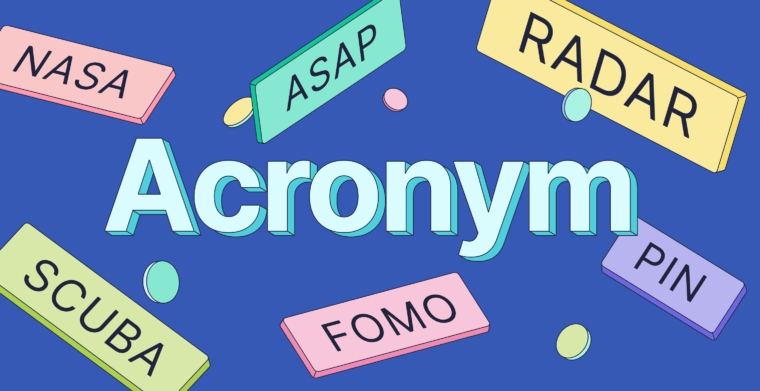Table of contents
- Acronyms and initialisms
- Abbreviations for courtesy titles and academic degrees
- Latin abbreviations
- Other common abbreviations
An abbreviation, simply put, is a shortened form of a word. In writing, abbreviations are useful when you need to squeeze a lot of writing into a small space. You can also use them in place of long or cumbersome phrases to make your sentences easier to read.
One thing to remember about abbreviations is that certain ones are considered informal. If you are writing something very formal, it’s better to err on the side of spelling things out. The other thing to remember is that some readers may not know what an abbreviation means. If the abbreviation is obscure or unfamiliar, make sure to explain what it means the first time you use it.
Acronyms and initialisms
Abbreviations come in a few different varieties. Both acronyms and initialisms are abbreviations that are formed by combining the initial letter or letters of each word into a longer name or phrase. Typically, acronyms and initialisms are written in all capital letters to distinguish them from ordinary words. (When fully spelled out, the words in acronyms and initialisms do not need to be capitalized unless they entail a proper noun.)
An acronym is pronounced as a single word, rather than as a series of letters. NASA, for instance, is an acronym. It stands for National Aeronautics and Space Administration. Occasionally, an acronym becomes so commonplace that it evolves into an ordinary word that people no longer think of as an acronym. The words scuba and laser, for instance, originated as acronyms (self contained underwater breathing apparatus and light amplification by stimulated emission of radiation, respectively).
Initialisms are similar to acronyms in that they are also formed using the first letter of each word in a longer phrase. Unlike acronyms, however, initialisms are pronounced as a series of letters. NFL (National Football League), for example, is pronounced en-eff-ell.
If you need to use an indefinite article before an acronym or initialism, use the initial sound of the word (not necessarily the initial letter) guide your choice.
Internet slang often takes the form of initialisms: LOL, IDK, IMO, BRB. Although this type of slang isn’t appropriate for important correspondence like emails to your professor or colleagues, or in online comments when you want to be taken seriously, it can be handy for informal online chatting, especially if you type slowly.
Abbreviations for courtesy titles and academic degrees
Titles such as mister, miss, and doctor, as well as the names of academic degrees such as bachelor of arts and doctor of philosophy are almost always abbreviated. In American English, title abbreviations are followed by a period; in British English, the period is omitted.
The most common title abbreviations include:
Mr. = Mister
Mrs. = Mistress (pronounced “missus”)
Ms. = (pronounced “miss” or “miz”)
Sr. = Senior
Jr. = Junior
Dr. = Doctor
Mr. Green asked Ms. Grey if she had met Dr. Jekyl. (American style)
Mr Green asked Ms Grey if she had met Dr Jekyl. (British style)
The most common academic degree abbreviations include:
B.S. = Bachelor of science
B.A. = Bachelor of Arts
M.A. = Master of Arts
M.B.A. = Master of Business Administration
Ph.D. = Doctor of Philosophy
The periods are optional with abbreviations of academic degrees. Follow whichever style your style guide recommends, or just choose one and use it consistently. When an academic degree is used like a title, it follows a person’s name and is set off by commas:
Molly Beagle, Ph.D., runs the canine cognition lab at Stanford University.
Latin abbreviations
There is a small handful of abbreviations for Latin terms that are used (and misused) frequently in English writing. Use periods with these abbreviations.
e.g.: exempli gratia
It means “for example.” Use e.g. when you want to provide specific examples of a generalization.
i.e.: id est
It means “that is.” Use i.e. when you want to provide more specific information about something you mentioned.
etc.: et cetera
It means “and so forth.” Use it when you’re providing a partial list of details.
Other common abbreviations
Below are a few other abbreviations that are common in English. Remember that abbreviations are not always completely standardized. One style guide may advise you to abbreviate Thursday as Thurs. while another may argue for Thu. Likewise, some style guides allow you to omit the periods with these abbreviations, but it’s never wrong to include periods. So if you aren’t sure whether to use the periods, err on the side of leaving them in.
Times and dates
a.m. (ante meridiem) = before noon
p.m. (post meridiem) = after noon
Jan., Feb., Mar., Apr., May, Jun., Jul., Aug., Sep., Oct., Nov., Dec.
Mon., Tues., Wed., Thurs., Fri., Sat,. Sun.
Places
U.S. (United States)
U.K. (United Kingdom)
E.U. (European Union)
U.A.E. (United Arab Emirates)
Units of Measurement
- (inches)
- (feet)
lbs. (pounds)
- (millimeters)
- (centimeters)
- (meters)
- (milligram)
- (gram)
- (kilogram)






